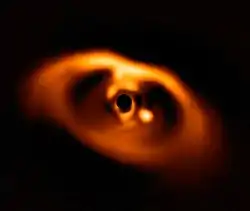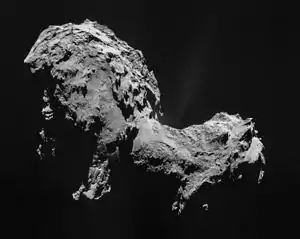51 Eridani b
51 Eridani b is a "Jupiter-like" planet that orbits the young star 51 Eridani, in the constellation Eridanus.[3] It is 96 light years away from the solar system, and it is approximately 20 million years old.[4]
.gif) Direct imaging of 51 Eri b | |
| Discovery | |
|---|---|
| Discovered by | Macintosh et al. |
| Discovery date | Dec 2014 |
| Imaged | |
| Orbital characteristics | |
| 11.1+4.2 −1.3 AU | |
| Eccentricity | 0.49 (± 0.15) [1] |
| 10260+6300 −1800 d | |
| Inclination | 136.0 (± 11.0) [1] deg |
| 2452014.79 (± 12.0) [1] JD | |
| 84.0 (± 58.0) [1] deg | |
| Star | 51 Eridani |
| Physical characteristics | |
Mean radius | 1.11+0.16 −0.13 RJ |
| Mass | 2.6 (± 0.3) MJ |
| 3.5 g | |
| Temperature | 700 K[2] |
Discovery
51 Eridani b was announced in August 2015, but was discovered in December 2014 using the Gemini Planet Imager, an international project led by the Kavli Institute for Particle Astrophysics and Cosmology. 51 Eridani b is the first exoplanet discovered by the Gemini Planet Imager.[5] The Gemini Planet Imager was specifically created to discern and evaluate dim, newer planets orbiting bright stars through “direct imaging.”[6] Direct imaging allows astronomers to use adaptive optics to sharpen the resolution of the image of a target star, then obstruct its starlight.[6] Any residual incoming light is then scrutinized, and the brightest spots suggest a possible planet.[6] Prior to the discovery of 51 Eridani b, each of the directly-imaged worlds previously discovered had been gas giants many times the mass of Jupiter.[7]
Physical characteristics
The planet has a mass around 2.6 times that of Jupiter, and about 1.11 times its radius. It orbits 11.1 AU from its host star, and has an orbital period of roughly 10,000 days.[1] The average temperature is 700 K, which is substantially hotter than the 130 K average temperature of Jupiter, the planet in the Solar System of closest size.[8] It has the second strongest methane signature of any exoplanet, after GJ 504 b.[9] This methane signature, along with the low luminosity of the object, should produce additional clues as to how 51 Eridani b was formed.[5] Astronomers also detected the presence of water in the planet's spectrum.[10] Atmospheric modeling favors a low surface gravity and a partly cloudy atmosphere.[7]
References
- "Planet 51 Eri b". The Extrasolar Planets Encyclopaedia. Retrieved 25 December 2020.
- Discovery and spectroscopy of the young Jovian planet 51 Eri b with the Gemini Planet Imager, B. Macintosh, and the GPIES team, Science Published Online August 13, 2015 doi:10.1126/science.aac5891.
- Choi, Charles (August 13, 2015). "Found! 'Young Jupiter,' the Smallest Exoplanet Directly Seen by Telescope". Retrieved August 15, 2015.
- Hadhazy, Adam (August 13, 2015). "'Young Jupiter' 51 Eridani b: Why Directly Imaging an Exoplanet Is Big". space.com. Retrieved August 15, 2015.
- University, Stanford (13 August 2015). "Astronomers discover 'young Jupiter' exoplanet".
- Culler, Jessica (14 August 2015). "NASA Scientists Help Understand Newly Discovered Planet".
- Billings, Lee. "Astronomers Glimpse a Young Jupiter, 51 Eridani b".
- "Exoplanet 51 Eridani b: A Red-Hot Young Jupiter Around Distant Star (Infographic)".
- "Astronomers Discover Young Planet That Looks Like Jupiter 100 Light Years Away".
- "Young 'alien Jupiter' discovered". 14 August 2015 – via www.bbc.co.uk.



